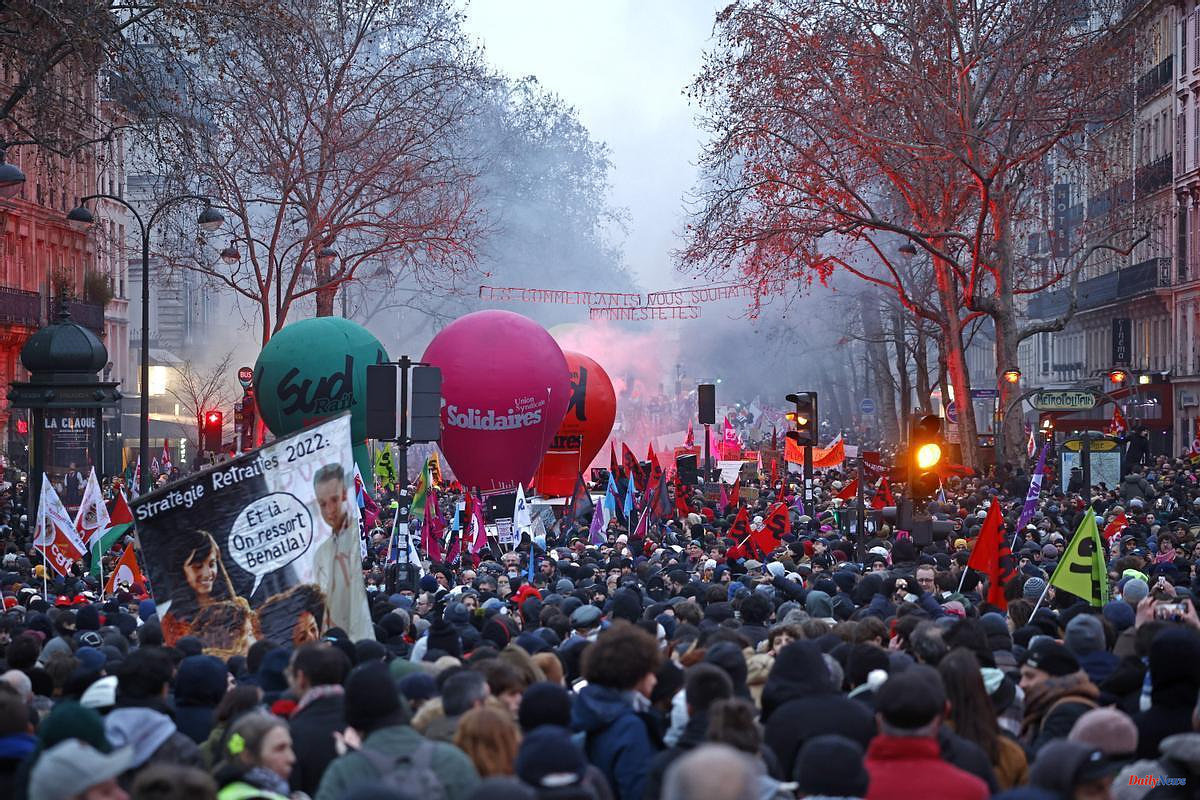France faces the sixth strike on Tuesday against Emmanuel Macron's pension reform, the most crucial to date, as it is expected to be the most massive. The unions want to blockade the country. There is talk of "Black Tuesday", the day of "social tsnunami" or "apocalypse". It will be, in the words of the Minister of Transport, Clément Beaune, the toughest day of all lived so far.
There are 265 demonstrations called throughout the country. Transport, refineries and the educational sector will stop. The unions also plan to extend the strikes from today. They maintain that the real movement against the project "begins now." The CGT, the most combative union, has announced the blockade on the shipment of fuel to all the refineries in the country.
This day is important because it could be the one that unbalances the forces in this fight between the Government, which insists on not giving in to the idea of delaying retirement from the current 62 years to 64, and the French, who are resisting it. It is an ordeal of the unions, with a lot of weight in the country and which have been calling for a total blockade for weeks to "bring the French economy to its knees."
On the other side is a government that has been multiplying public and media interventions for a month and a half to make "pedagogy" of a reform that no one accepts, no matter how much it is explained to them. 68% of French people are against it. In previous demonstrations, many young people were seen lamenting because they are going to retire too old.
The Government's argument is that, if this continues like this, they are going to be left without a pension, since the system is in deficit: there are more people collecting it than working to pay it. Another of the reasons that justify the project is that France is almost an exception in Europe, since in neighboring countries the retirement age is 65 or 67.
This reform, which was approved in January and has caused Macron's popularity to plummet, has brought to light a very recurring debate every time a pension reform is considered: the French do not want to live to work, but rather the contrary. . They also don't want to reach retirement when they can't enjoy it. The banners of the demonstrations, alluding to a near death, highlight this idea.
There have already been five days of mobilizations and the participation in the strikes has been deflating, especially in some sectors, such as education, since each day of strikes costs money to those who support it.
The unions today are risking their ability to make the Executive back down, if they manage, as they claim, to paralyze the country. 60% of the French are in favor of doing so. The government spokesman, Olivier Véran, has indicated that this "would be the apocalypse". The one from Transport, Clément Beaune, has asked the French who can telework. "It will be the hardest day of all lived so far," he added.
Strong collapses in transport are expected. In France there are no minimum services, so a blockage in the metro or commuter train has a great impact, since it prevents many from going to work or taking their children to school. The carriers began the stoppages on the roads on Monday. This could affect the supply in the logistics centers, if they are prolonged.
At airports, these could affect 20-30% of flights and high-speed, suburban and regional trains will run one in five or four. As in the previous strikes, there will be lines of the Paris metro that will not work and only the automatic ones will work normally.
On another front, the parliamentary one, the project enters its decisive week in the Senate this week, after a conflictive and chaotic process in the Assembly in which, due to the number of amendments presented, it was not possible to debate the key article, the that delays the retirement age and the main reason for the protests. After the Senate, the reform will be debated in a mixed commission and should be approved, at the latest, on March 26.
According to the criteria of The Trust Project












